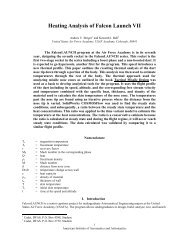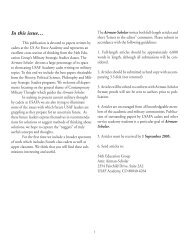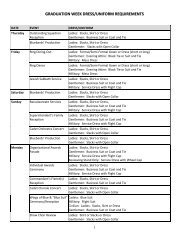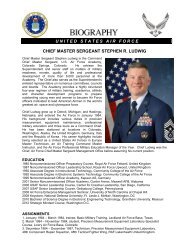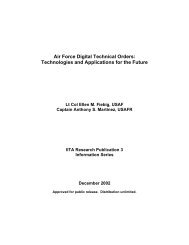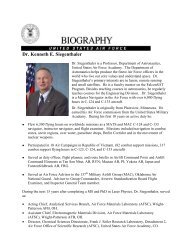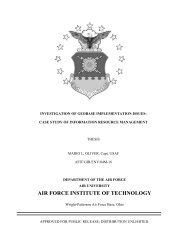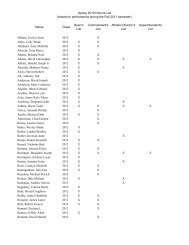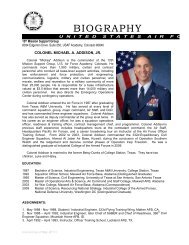the rollback of south africa's biological warfare program
the rollback of south africa's biological warfare program
the rollback of south africa's biological warfare program
You also want an ePaper? Increase the reach of your titles
YUMPU automatically turns print PDFs into web optimized ePapers that Google loves.
Hani, leader <strong>of</strong> Umkhonto we sizwe (MK) and <strong>the</strong> South African Communist<br />
Party, as well as a possible successor to Nelson Mandela, was killed in a rightwing<br />
hit operation. The fear <strong>of</strong> a “third force” and a right-wing coup<br />
continued.<br />
During this period <strong>of</strong> negotiations, instability and violence, many in <strong>the</strong><br />
regime believed that <strong>the</strong>y needed insurance against <strong>the</strong> ANC/MK and <strong>the</strong><br />
“black onslaught.” With this in mind, <strong>the</strong> CBW <strong>program</strong> was kept intact by<br />
Basson and his associates as insurance and was used in assassination attempts.<br />
Also, experiments with chemical <strong>warfare</strong> apparently continued, with an alleged<br />
attack on Mozambican troops as late as January 1992. At <strong>the</strong> same time,<br />
Basson, Philip Mijburgh and o<strong>the</strong>rs were in <strong>the</strong> process <strong>of</strong> milking Project<br />
Coast for all <strong>the</strong> financial gain possible. Basson began to establish contacts<br />
with foreign governments, such as Libya, which might be interested in<br />
purchasing CBW secrets. Soon, Basson became <strong>the</strong> target <strong>of</strong> investigation<br />
from <strong>the</strong> National Intelligence Service (NIS), SADF counterintelligence, and<br />
<strong>the</strong> Office <strong>of</strong> Serious Economic Offenses, as well as <strong>the</strong> CIA and MI-6. The<br />
investigations culminated in <strong>the</strong> Steyn Report <strong>of</strong> December 1992<br />
De Klerk’s Efforts to Roll Back Secret SADF Projects<br />
When de Klerk became President in 1989, he sought to find out about <strong>the</strong><br />
secret projects <strong>of</strong> <strong>the</strong> SADF, including <strong>the</strong> nuclear weapons and CBW<br />
<strong>program</strong>s. On 30 July 1989, President de Klerk announced formation <strong>of</strong> <strong>the</strong><br />
Kahn Committee. It issued three interim reports and a final report on 19<br />
November 1991. Its mandate was limited: <strong>the</strong> committee considered only<br />
projects brought to its attention by <strong>the</strong> various state departments that were still<br />
operative, with a view to recommending <strong>the</strong> cancellation <strong>of</strong> covert activities<br />
wherever possible. Where <strong>the</strong> committee was <strong>of</strong> <strong>the</strong> opinion that projects<br />
should be allowed to continue, recommendations were to be made for <strong>the</strong><br />
possible scaling down and, where necessary, adaptation <strong>of</strong> such projects. The<br />
committee was requested to ensure that projects did not benefit any particular<br />
44




